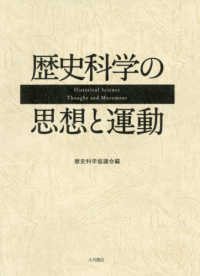- ホーム
- > 洋書
- > 英文書
- > Politics / International Relations
Full Description
This book traces the origins and evolution of alcohol prohibition in India, drawing on extensive archival research and rich vernacular sources to explain its surprising resilience over time. Since its inception, prohibition has functioned as both an ideal and a tool of state power—a dual role that has worked to shape its shifting trajectories. Each phase of prohibition's enforcement has served to reaffirm its founding logic, thereby further embedding it in the machinery of governance. Foregrounding intersections with caste and gender, the book illuminates how diverse social responses have made prohibition a deeply contested—'sobering'— yet remarkably enduring project. While prohibition may be a thing of the past in the West, in India, history keeps it alive as a manifestation of postcolonial governmentality.
Contents
Dedication, Acknowledgements, List of Abbreviations, Note on Translation, Introduction. Setting the Stage; 1. The Madras Abkari Act of 1886; 2. Congress Nationalism, Provincial Politics, and the Road to Prohibition; 3. The Development of a Prohibition Culture and Ideal; 4. The Prose of Subaltern Alcoholism and Prohibitioning; 5. Liquor Businesses and The Business of Prohibition; 6. Enforcing the Madras Prohibition Act; 7. Prohibition in Independent India; Conclusion; Bibliography.







